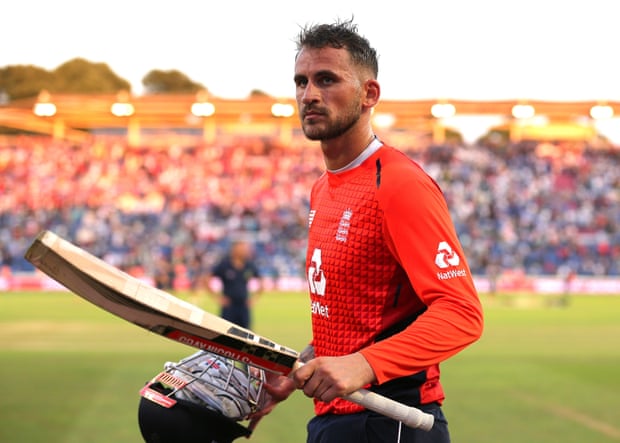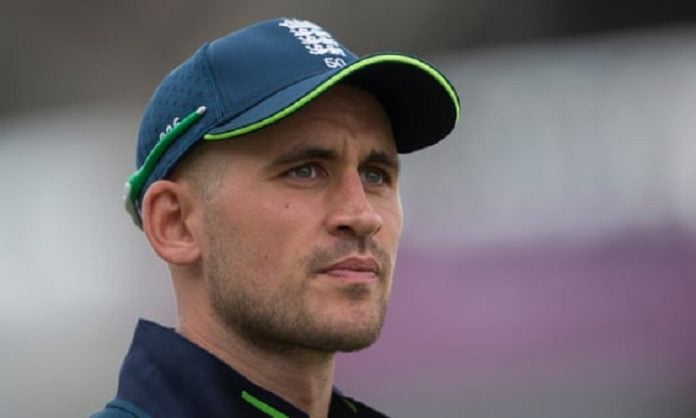The England batsman and World Cup contender Alex Hales is serving a 21-day ban from cricket for recreational drug use, the Guardian can reveal.
Hales, 30, has missed the start of his county Nottinghamshire’s Royal London Cup campaign, with the club stating last Thursday that he had “made himself unavailable for selection for personal reasons” and setting no date for his return.
It is understood that Hales, named last week in England’s preliminary World Cup squad, is in fact suspended at present, having fallen foul of the England and Wales Cricket Board’s recreational drugs policy for the second time in his career.
Read More: Alex Hales to join England’s World Cup preparation camp
Hales is still expected to attend England’s training camp in Cardiff this weekend. But the development is another blow for a player who was suspended and fined by England last year after he and Ben Stokes were involved in a street fight outside a Bristol nightclub in September 2017.
All professional men’s cricketers in England and Wales – as well as centrally contracted women’s players – are subject to hair follicle tests at the start and end of every season that can detect substances in the system for up to three months.
The policy initially treats the issue as one that relates to health and welfare. A first offence is dealt with privately via rehabilitative support from the Professional Cricketers’ Association and the chief medical officer at the player’s county.
A second such violation has additional ramifications beyond rehabilitation, however, invoking a three-week ban and a fine totalling 5% of the player’s annual salary. It is only at this stage that their county is informed, as well as the ECB chief executive, Tom Harrison, and PCA equivalent, David Leatherdale.
As a centrally contracted England player, Hales will also have seen this information shared with Ashley Giles, the director of England cricket. It is only after a third positive test result – something which triggers a 12-month ban – that the ECB or the county can tear up a player’s contract.
Players are suspended from the date they receive written confirmation of a positive result and it is yet to be established when exactly Hales received notice of his second violation. It is believed he will have served his 21 days before England’s opening fixture of the summer against Ireland in Dublin on 3 May.
It is a match he would expect to feature in, given the first-team players Jos Buttler, Jonny Bairstow, Ben Stokes and Moeen Ali are all down to be rested; having lost his place following the Bristol nightclub incident in September 2017, Hales has spent the past 18 months as the first reserve batsman who craves such opportunities.
This week the Guardian contacted the player’s representative, Nottinghamshire, the ECB and the PCA for comment.
The player’s representative declined to comment. Nottinghamshire did not respond to the request. A spokesperson for the ECB said: “We can’t comment on this matter.”
The PCA said it would not comment “on any individuals in relation to the recreational drugs policy”.

At this stage his employers are said to be supporting a player who has privately struggled with the fallout from the ill-fated night out that led to both he and Stokes accepting two charges apiece of bringing the game into disrepute. Stokes was cleared of affray after a trial at Bristol crown court; Hales was never charged.
Whether it affects his chances of featuring in the World Cup remains to be seen. But either way it is an unwelcome distraction for England, the world’s No 1-ranked ODI side, this close to their opening group match against South Africa at the Oval on 30 May. The selectors have until 23 May to confirm their final squad.
Read More: Foakes called up to England ODI squad in place of the injured Billings
During a candid interview with the Guardian this month – before notification of the positive result but likely after any drug use took place – a remorseful Hales said he had been prone to making “mediocre decisions” and would look to spend the rest of his career trying to change his public image.
Hair follicle testing for recreational drugs was introduced in 2013 following the death of Surrey’s Tom Maynard the previous year and the incremental nature of the regulations look to strike a balance between rehabilitation and deterrent.
Durham’s Jack Burnham is the only player to receive a 12-month ban during this time. The former England Under-19 batsman tested positive for cocaine for a third time in 2017 and though the club had the option to sack him they opted to give him another chance.


















